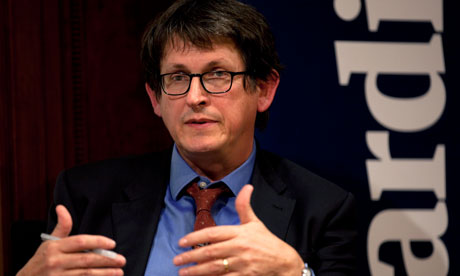The Guardian editor proposes a PCC-replacement he calls the Press Standards Mediation Commission (PSMC)
Guardian editor proposes new press regulator
Alan Rusbridger calls
for new independent body 'with teeth' that offers a 'one-stop shop'
mediation service for libel and privacy
Lisa O'Carroll
Friday 11 November 2011

The Guardian editor Alan Rusbridger has
proposed a new independent regulartor to replace to current Press
Complaints Commission. Photograph: Teri Pengilley
The Guardian's editor-in-chief has proposed a new independent
press regulator with teeth, offering a "one-stop shop" mediation service
for libel and privacy.
Alan Rusbridger, delivering the annual Orwell lecture, said he believed a new regulator, armed with powers to investigate, could offer a "quick, responsive, and cheap" way of resolving disputes.
It would be "our own one-stop shop disputes resolution service so that people never had to go to law to resolve their differences with newspapers".
Rusbridger suggests the new body could be entitled the Press, Standards and Mediation Commission (PSMC) and would replace the existing Press Complaints Commission, which is facing the axe after the Leveson inquiry publishes its findings.
He supported calls by the Daily Mail editor-in-chief Paul Dacre for a press ombudsman who could investigate serious lapses of standards on a "polluter pays" basis.
Rusbridger proposed that the PSMC would have a small number of staff to deal with libel cases in particular, with a panel of qualified mediators.
He suggested mediators could: decide on fairness and accuracy; whether the disputed article was opinion or an allegation of fact; whether it was in the public interest; whether the complainant had a reasonable chance to respond and whether their response was included.
Rusbridger also called on the industry and any other interested parties to come up with an agreed definition of "the public interest – and stick to it".
"If we fight legal actions and mount campaigns over articles that even we don't pretend are in the public interest as we define it, aren't we inviting people to be cynical about our motives and out commitment to self-regulation?" he asked.
Rusbridger said it was an "incredibly anxious time for journalism, with even the most powerful and professional newspapers clinging on to financial viability", and the Leveson inquiry would make for some "uncomfortable" moments.
But he said that while the upcoming Leveson inquiry may well uncover some "uncomfortable truths" about the way a number of journalists have acted in the past, that was "surely good, not bad".
Shining a light on bad practice would lead to good outcomes, he said, as transparency normally did.
"Leveson provides an opportunity for the industry to have a conversation with itself while also benefiting from the perspective and advice of others," Rusbridger added.
He said it provided "a-once-in-a-generation chance to celebrate great reporting" and to think again about what journalism at its best can do and what it should be.
Alan Rusbridger, delivering the annual Orwell lecture, said he believed a new regulator, armed with powers to investigate, could offer a "quick, responsive, and cheap" way of resolving disputes.
It would be "our own one-stop shop disputes resolution service so that people never had to go to law to resolve their differences with newspapers".
Rusbridger suggests the new body could be entitled the Press, Standards and Mediation Commission (PSMC) and would replace the existing Press Complaints Commission, which is facing the axe after the Leveson inquiry publishes its findings.
He supported calls by the Daily Mail editor-in-chief Paul Dacre for a press ombudsman who could investigate serious lapses of standards on a "polluter pays" basis.
Rusbridger proposed that the PSMC would have a small number of staff to deal with libel cases in particular, with a panel of qualified mediators.
He suggested mediators could: decide on fairness and accuracy; whether the disputed article was opinion or an allegation of fact; whether it was in the public interest; whether the complainant had a reasonable chance to respond and whether their response was included.
Rusbridger also called on the industry and any other interested parties to come up with an agreed definition of "the public interest – and stick to it".
"If we fight legal actions and mount campaigns over articles that even we don't pretend are in the public interest as we define it, aren't we inviting people to be cynical about our motives and out commitment to self-regulation?" he asked.
Rusbridger said it was an "incredibly anxious time for journalism, with even the most powerful and professional newspapers clinging on to financial viability", and the Leveson inquiry would make for some "uncomfortable" moments.
But he said that while the upcoming Leveson inquiry may well uncover some "uncomfortable truths" about the way a number of journalists have acted in the past, that was "surely good, not bad".
Shining a light on bad practice would lead to good outcomes, he said, as transparency normally did.
"Leveson provides an opportunity for the industry to have a conversation with itself while also benefiting from the perspective and advice of others," Rusbridger added.
He said it provided "a-once-in-a-generation chance to celebrate great reporting" and to think again about what journalism at its best can do and what it should be.
No comments:
Post a Comment
Comments and suggestions are very welcome ... but please ensure all comments are appropriate! All comments are moderated before publication. Spam will be reported